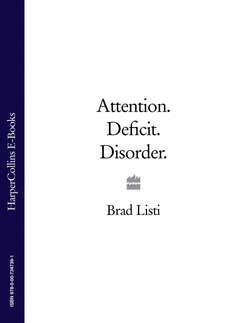Читать книгу Attention. Deficit. Disorder. - Brad Listi - Страница 20
14
ОглавлениеInspired by Horvak’s success on the open market, I sold all of my eBay shares one afternoon in late April, right before graduation, and started day-trading. The ensuing seven months were an odyssey. Evenings were spent delivering pizzas. Days were spent tracking stocks. I was averaging about four or five hours of sleep per night.
The winning was pretty much relentless. On a typical day, Horvak called me once every hour or so to celebrate. We had brief, ecstatic conversations about numbers and the future. We discussed travel plans and entrepreneurial concepts. I babbled about making an independent feature film. Horvak fantasized about buying a small resort hotel off the coast of Honduras. He sounded like he was on uppers all the time. His mind and his mouth were going a mile a minute. He was betting big, talking about early retirement with some degree of frequency. I think he was closing in on seven figures. My portfolio was growing rapidly as well, albeit on a much smaller scale. The simplicity of the arrangement was nothing short of mind-blowing. It seemed like the easiest thing in the world.
On an average day, I usually took a sizable nap after market close, if my adrenaline levels weren’t too high. Then, at about 9:00 p.m., I’d drive over to Fatty Jay’s for the late shift. Fatty Jay’s was the name of the pizza establishment that I worked for. I was just out of college, with a bachelor of fine arts degree in avant-garde filmmaking. All it had gotten me so far was Fatty Jay’s and day-trading.
avant-garde n.
A group active in the invention and application of new techniques in a given field, especially in the arts.
adj.
Of, relating to, or being part of an innovative group, especially one in the arts: avant-garde painters; an avant-garde theater piece.
With my stocks performing well, I could have cashed out and quit the pizza job, no problem. I could have taken my profits and hit the road. I thought about it several times, but I could never bring myself to go through with it. Chalk it up to indecision. At that point, the end of the boom was nowhere in sight. I didn’t want to cash out too soon and risk missing out on further profits. At the same time, the stock numbers seemed unreal to me. I didn’t trust them entirely. My money was totally intangible. I couldn’t wrap my head around it.
Horvak warned me continually that the entire enterprise could come crashing down at any second. We discussed this fact ad nauseam. We were desperate to be wise, advising each other to employ a conservative approach to rabid enthusiasm. We pondered the history of the markets and encouraged each other to stay with our jobs until we got off the ride. Quitting, we felt, might jinx us. It was better, we felt, to keep working hard, lest we anger the financial gods.
The longest I ever rode one stock was seventy-two hours. Some days I’d ride three or four stocks in a single session. My typical routine had me buying at open and cashing out sometime after midday. My goal was always a 2 percent return. If I made 5 percent, I automatically cashed out, no matter what time it was. That was the discipline. At the end of my run, I calculated the capital gains tax, set it aside in my money market account per Horvak’s strict instructions, and threw the rest back into the market the following morning. It was easy.
Naturally, my good fortune astonished me; it rattled me to the point of superstition. I didn’t talk about it very much, convinced that the market would crash if I said something. Horvak was my only real confidant. I remember telling him one day that I’d never felt luckier in my whole life. I told him that, for the first time ever, I found myself wondering if someone or something was actually watching over me.
“Maybe it’s my granddad,” I said, half kidding. “Maybe he’s supervising my investment portfolio from the next realm.”
Horvak told me that he liked day-trading better than weed.
